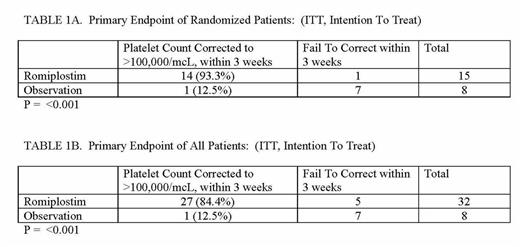Abstract
Background:CIT is a common complication of chemotherapy, resulting in delay or dose reduction of treatment. There is no approved or validated treatment. We report the first prospective trial showing correction and prevention of recurrence of CIT.
Methods: A phase II, open label trial of romiplostim, a thrombopoietin receptor agonist, versus observation control. Solid tumor patients with at least 4 weeks of thrombocytopenia (<100,000/mcL), despite reduction or delay in chemotherapy were randomized, 2:1 to weekly romiplostim versus observation. Primary endpoint was correction of platelet count to >100,000/mcL within 3 weeks. Secondary endpoints included safety and resumption of chemotherapy without recurrence of CIT. Observation patients who failed to correct their platelet counts, were eligible to cross-over to receive romiplostim (not shown). Analysis was by Intention-To-Treat, and statistics were by two-tailed Fisher's exact test.
Results: 40 patients were enrolled. Mean age was 58 years (range 28-77). All patients had either metastatic disease (35), or locally advanced disease (5). The majority had GI cancer (22). When 8 observation patients were enrolled and reached primary endpoint, an unplanned interim analysis revealed significant benefit of romiplostim (Table, P = <0.001). The observation arm was discontinued out of consideration for trial beneficence, and the trial continued accrual as a single arm study of romiplostim.
Of the 32 patients who received romiplostim upfront, 27 (84%) corrected their platelet counts within 3 weeks. Of the 5 failures, 2 patients were protocol violations because their chemotherapy was prematurely resumed prior to platelet correction. The mean effective romiplostim dose for platelet count correction was 2.5 mcg/kg (range 1.8-4.1). 25 patients resumed chemotherapy after correction of their CIT and weekly romiplostim was titrated for target platelet count of 150,000mcL. Only one patient had recurrence of CIT.
We saw no evidence of adverse effects on the bone marrow. Four (12.5%) of the 32 romiplostim patients experienced a thrombosis. One had a symptomatic PE, one had an incidentally identified PE and two patients had calf DVTs. These patients were all at high risk of thrombosis, with metastatic or locally advanced pancreas (2), colorectal, and hepatocellular carcinoma.
Only three patients in the romiplostim cohort required platelet transfusion. One had an upper GI bleed from a gastric tear, and two patients received platelet transfusion during terminal hospitalizations for progression of disease.
Discussion: We demonstrate that romiplostim can effectively reverse CIT in solid tumor patients, allowing for resumption and maintenance of cancer-directed therapy in the large majority of patients. Based on prior literature, a thrombosis rate of 12.5% in patients with metastatic GI cancers, on chemotherapy, is within the expected range. Further study is needed to determine in which settings effective treatment of CIT will lead to meaningful clinical benefit.
Soff: Janssen: Consultancy, Research Funding; Amgen: Consultancy, Research Funding.
Author notes
Asterisk with author names denotes non-ASH members.


This feature is available to Subscribers Only
Sign In or Create an Account Close Modal